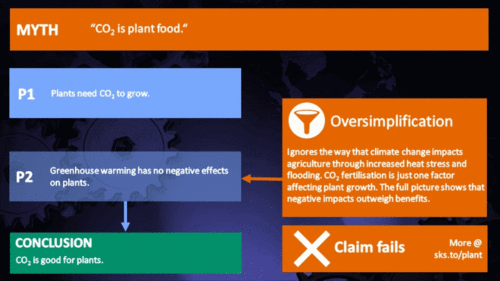

Deconstructing climate misinformation to identify reasoning errors
Cook, J., Ellerton, P., & Kinkead, D. (2018). Deconstructing climate misinformation to identify reasoning errors. Environmental Research Letters, 13(2), 024018. Link to PDF & Link to Supplement
The table below is inspired by the simplified supplement and may differ slightly from what is shown in the GIF. This is mostly due to make the text fit into the available space which made it necessary to reword some of it.
| 1 | Identify claim | CO2 is plant food. |
| 2 | Argument structure | Premise 1: Plants need CO2 to grow. Conclusion: CO2 is good for plants. |
| 3 | Inferential Intent |
Deduction |
| 4 | Validity | INVALID Fails to take into account negative impacts of global warming on plant growth. |
| 4a | Hidden premises | Premise 1: Plants need CO2 to grow. Premise 2: Greenhouse warming has no negative impacts on plants. Conclusion: CO2 is good for plants. |
| 5 | Check premises | Premise 1 is true. Premise 2 is false and slothful induction. CO2 fertilisation is just one factor affecting plant growth. Climate change impacts agriculture through increased heat stress and flooding. The full picture shows that negative impacts outweigh benefits. |
| 6 | Status of claim | FALSE The argument is made valid with an extra premise but the premise is false. |
| 7 | Summary of fallacies | Slothful induction: Ignores the ways that climate change impacts agriculture through increased heat stress and flooding. CO2 fertilisation is just one factor affecting plant growth. The full picture shows that negative impacts outweigh benefits. |
Plants cannot live on CO2 alone
Blog post with background information about the myth deconstructions: Myth deconstructions as animated gifs
To learn more about the fallacies used in the myth deconstructions: A history of FLICC: the 5 techniques of science denial
 |
The Skeptical Science website by Skeptical Science is licensed under a Creative Commons Attribution 3.0 Unported License. |